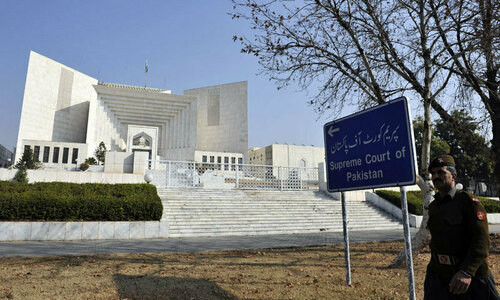ISLAMABAD: The Supreme Court ruled on Thursday that a federal minister did not enjoy any authority under the laws governing the Evacuee Trust Property Board (ETPB) to approve the sale of evacuee land either in his discretion, or in relaxation of any provision of the law.
“And if the actions of the concerned federal minister were bereft of executive nature, then as a natural corollary, they cannot be construed as being authorised by the President of Pakistan in terms of Article 99 of the Constitution,” said a 19-page judgement authored by Justice Ijaz-ul-Ahsan.
On Aug 4, a two-judge Supreme Court bench had rejected a plea challenging a Jan 18 order of the Lahore High Court’s Rawalpindi bench that declared illegal the sale of commercial property, belonging to the ETPB in Raja Bazaar and worth billions of rupees, to a real estate investor.
The bench, consisting of Justice Ahsan and Justice Yahya Afridi, released a detailed judgement on Thursday.
The case concerns the sale of a Rawalpindi property in 1992, approval of which was given by the federal minister for social welfare way back in 1977.
The commercial property was under the ETPB’s control and initially rented out to Raja Ali Zaman (deceased) and Raja Muhammad Banaras (both of them vendees) by the authority concerned on behalf of ETPB. During the tenure of their tenancy, the vendees approached the then federal minister for Social Welfare and Rural Development for outright sale of the property.
Through a memorandum issued on March 22, 1977, the request was granted and on June 6, 1992, a deputy administrator of ETPB executed the sale deed in favour of the vendees.
Munir Paracha had represented the appellants while Hafiz Ahsan Khokhar appeared on behalf of the ETPB.
The detailed judgement explained that all land or properties managed and supervised by the bureau belong to the federal government and it was only after seeking permission from the latter that the ETPB can be permitted to sell or dispose of land under its supervision.
Therefore, the judgement said, it is incumbent upon the ETPB to seek permission from the federal government for disposing of any land under its management or supervision.
If the ETPB’s board did not move a resolution recommending sale, or sought permission to sell a private property, it will be deemed that the federal government’s permission was never sought for the sale of the property in question.
But if it was the federal government that wished to sell any land under ETPB management, the process for doing so would be to refer the matter to the bureau’s board. The board would give its recommendations to the federal government before any sale was carried out, the judgment said.
After the federal government has accorded its approval, the ETPB chairman would then exercise authority under Section 12 of the ETPB Act by designating an officer to carry out the sale of the land or property, the judgement explained.
In essence, to sell or dispose of land managed by the ETPB, a resolution has to be passed by its board. The resolution has then to be approved by the federal government, according to the verdict.
But it regretted that the present government had nothing on record to suggest that the appellant applied to the ETPB or approached the federal minister concerned, unlike the bureau, who through March 22, 1977 memorandum, accorded approval for the sale.
If an application was filed by the appellants with ETPB, the court observed, the matter would have been taken up by its board, but the suit property could only have been sold subject to a resolution and approval by the federal government.
Minister’s powers
The March 22, 1977, memorandum also showed, the judgment said, the price of land was determined by a federal minister, but he was not the competent person to do so.
In the absence of an “appropriate application” and without it being processed in the departmental hierarchy, the entire superstructure of the transaction, which ended with the sale deed, was based on an unlawful exercise and, therefore, any action taken on the basis of the memorandum was unlawful and inconsequential vis-à-vis the ETPB and the federal government’s rights.
The judgement explained that Article 173 of the Constitution deals with the power of the federation as well as the provinces to acquire property and to make contracts.
There is a presumption that the legislature intends to legislate on matters in harmony with the Constitution and that the courts will give effect to the will of the legislature manifesting itself through the laws passed by the legislature.
When the federal minister concerned accorded approval for sale of the suit property even though he was not authorised to do so, his action cannot be considered as an executive action, the apex court ruled.
The Lahore High Court rightly concluded that being bereft of its executive nature, the sale deed had been obtained without the federal government’s approval and was therefore illegal, the Supreme Court said and dismissed the appeal.
Published in Dawn, August 26th, 2022









































